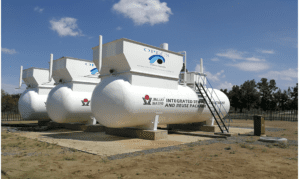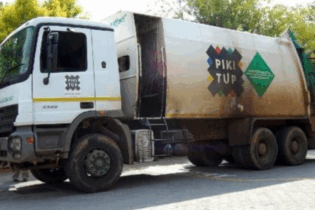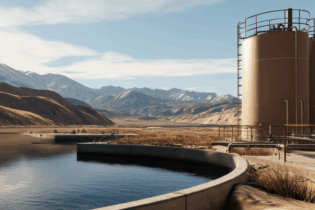The rapid rate of urbanisation, combined with steady population growth, is placing pressure on existing wastewater treatment plants, pushing up processing and maintenance costs, as older facilities struggle to keep pace with rising inflows. IMIESA speaks to SiyabulelaFanie, CEO at OPECS, about a revolutionary and field-proven alternative.
Operations and Enhancements Consulting Services (OPECS) entered the wastewater segment in 2015, following the conclusion of a partnership agreement with Chinese OEM Jinluo Water – a leader in water and wastewater solutions. Jinluo is ranked in the top 50 privately registered companies in China, a remarkable achievement given this highly competitive domestic market. Within the wastewater sector, Jinluo’s proprietary SPRAS (Sludge Process Reduction Activated Sludge) technology challenges conventional treatment approaches. There are three key factors to note:- No chemicals are required for the processing of domestic wastewater, while only a nominal portion is needed for industrial effluent.
- No downstream organic sludge is generated – it’s broken down and eliminated – so that rules out the issue of sludge discharge, which remains problematic and costly for conventional plants in terms of disposal and environmental compliance. Plus, the elimination of chemical dosing passes on major operational cost savings for utilities
and municipalities. - SPRAS is energy efficient, consuming as little as 0.5 kW per m3. Plants can run on a combination of mains, generator and solar power. But even without any power,
the SPRAS treatment stream continues uninterrupted for up to eight hours, thanks to the
inherent technology.
Plug and play
“The overriding benefit is that the wastewater treated in our package plants meets Department of Water and Sanitation and international quality standards, plus it’s a plug and play solution, which means it’s a site-specific response that’s not reliant on centralised conventional infrastructure layouts that include sewer lines running for kilometres,” Fanie explains. The technology is also ideally suited to meet various reuse applications: some 90% of the treated water is reusable. That’s an important point to emphasise since South Africa is a water-scarce country that, along with many other nations worldwide, faces challenges when it comes to delivering clean potable water. “Going forward, we have to rule out using potable water for non-human consumption needs and SPRAS fills this gap. Reuse must become the norm for non-potable requirements like crop irrigation, toilet flushing, construction, and general cleaning. In this respect, SPRAS is an ideal solution,” he continues. “It’s the answer when it comes to supplementing or supporting conventional wastewater treatment plants nationally, a number of which are not compliant and are discharging raw, untreated effluent into rivers.”Pilot projects and commercialisation
Since entering the market, OPECS has successfully completed two pilot projects that have proven the efficacy of the technology, then subsequently moving on to full-scale commercial operations. Plants can be supplied in a broad range of sizes, from as small as70 m3 per day to 10 Mℓ facilities and higher. The technology also lends itself to BOOT (build, own, operate and transfer) opportunities.
The first pilot study was completed for the Sundays River Municipality in the Eastern Cape, where an existing treatment plant was not performing to standard. OPECS deployed two 150 m3/day package plants to increase the capacity of the existing facility. This had a direct benefit for the region’s citrus growing community, which was now able to comply with export standards thanks to the use of compliant irrigation water supplied via the OPECS plants.
The second pilot study was for Chris Hani Municipality in Cradock, Eastern Cape, where OPECS deployed a 300 m3/day plant, also as a backup to the in-situ treatment works. This was an urgent intervention, as the municipal plant was discharging raw sewage into the river. Glen Agricultural College OPECS’s first commercial project was for the Glen Agricultural College, an institution falling under the Free State Department of Agricultural and Rural Development. This OPECS operations and maintenance (O&M) project is now in its second year. This plant, which is owned by the college, replaced an obsolete, existing plant. Before the college went out on public tender, it analysed the costs of refurbishing the existing plant. OPECS’s package solution came in at around half that price. The savings are even greater when the cost of chemicals is subtracted from the college’s future operational expenditure budget. OPECS has three units running at the college. Combined, they treat approximately 450 m3 daily, serving some 2 800 people. Like with all package plant installations, they are designed to work together or independently, so they can be scaled up or down depending on the load. In terms of new projects, OPECS recently concluded a three-year agreement with the Free State Department of Basic Education to roll out package plants at designated schools across the province. This will be on an O&M basis. Growth in Africa OPECS is also responding to recent enquiries from a number of African countries, which include Kenya, Nigeria and Rwanda, all of which have identified sanitation as a national priority. In the meantime, OPECS has secured a contract for a private residential developer in Kenya. “Our goal is to partner with national government, municipalities and consulting engineers to collaborate in accelerating water and sanitation delivery,” says Fanie. “We believe SPRAS would be ideal for many new community developments that can now be developed with decentralised treatment facilities. SPRAS technology is compact and efficient, and odourless, plus its operation is silent, making it well suited to urban environments. Additionally, our plants can be installed alongside conventional works to supplement and increase capacity. “In the meantime, we are expanding the business to meet current and future growth demands, focusing on recruiting and developing the best engineering and technical talent. That will be combined with ongoing organic growth through project excellence,” Fanie concludes.






